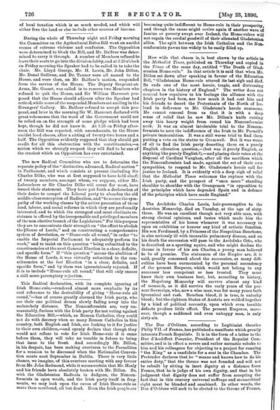How wide that chasm is, is best shown by the
article in the Methodist Times, published on Thursday and copied in the Times of the same day, entitled "The Death of Glad- stonian Home-rule." In that article it is said that when Mr. Dillon sat down after speaking in favour of the Education Bill, " Gladstonian Home-rule uttered its last sigh and died. So ends one of the most heroic, tragic, and distressing chapters in the history of England." The writer does not conceal bow repulsive to his feelings the alliance with the Irish party had been, nor how much it had cost him and his friends to desert the Protestants of the North of Ire- land in deference to Mr. Gladstone's heroic summons. He cannot conceal from us that it is with a deep sense of relief that he saw Mr. Dillon's knife cutting away this heavy weight from round his Nonconformist neck. It was an almost intolerable trial to the Noncon- formists to note the indifference of the Irish to Mr. Parnell's private immoralities. It was a still worse trial to find them putting a veto on the statue to Cromwell. But it was worst of all to find the Irish party deserting them on a purely English education question,—(but was it purely English, or anything like purely English ?),—and placing their votes at the disposal of Cardinal Vaughan, after all the sacrifices which the Nonconformists had made, against the set of their own sympathies, to respond to Mr. Gladstone's heroic call for justice to Ireland. It is evidently with a deep sigh of relief that the Methodist Times welcomes the rupture with the Irish party, and the prospect of "once more" standing shoulder to shoulder with the Orangemen "in opposition to the principles which have degraded Spain and in defence of the principles which have made England."


































 Previous page
Previous page